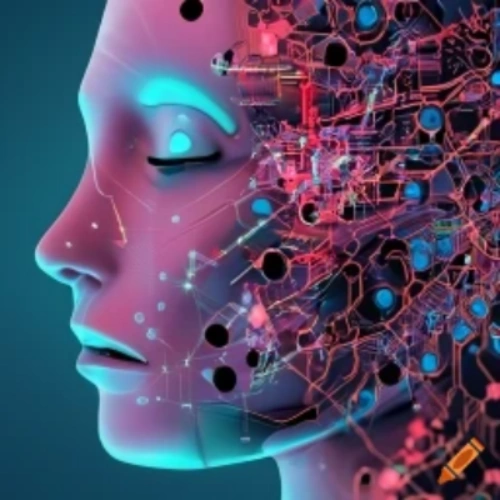
With its roots dating back to the 1950s (Symbolic AI, GOFAI, connectionist approach), and at a 1956 Dartmouth workshop when the "Artificial Intelligence" term gained its name, the artificial intelligence (AI) industry has emerged rapidly, from the second decade of the 21st century with new mass consumer applications and uses being realized largely upon the Internet.
OpenAI, a company co-founded (and invested in) by the industrialist Elon Musk in 2015, championed a hypothetical type of artificial intelligence – artificial general intelligence (AGI) – that would have the ability to understand and reason like a human being. OpenAI's goal is to ensure that AGI benefits all of humanity (friendly AI), and to avoid the potential dangers of the technology. In 2021, OpenAI introduced DALL-E, a deep-learning model that can generate digital images from natural language descriptions. And in late 2022, OpenAI released ChatGPT which is built upon OpenAI's foundational GPT (Generative Pre-trained Transformer) models, specifically GPT-3.5 and GPT-4.
Some of the most promising areas of AI development include:
Natural Language Processing (NLP). NLP is the ability of computers to understand and process human language. This technology is being used to develop voice response robots people interact with during phone calls, virtual assistants, translation tools, and new AI chatbots people engage from their computer and/or mobile devices.
Computer Vision. Computer vision is the ability of computers to see and understand the world around them, which then enables innovations in self-driving cars, facial recognition systems, medical imaging tools, and other areas in the planning.
Machine Learning. Machine learning is the ability of computers to learn and improve without being explicitly programmed. This technology is being used to develop new spam filters, fraud detection systems, and personalized recommendations.
Robotics. Robotics is the field of computer science that deals with the design, construction, operation, and application of robots. Robots are increasingly being used in a variety of industries, including manufacturing, healthcare, and logistics.
Generative AI. Generative AI is a type of artificial intelligence that can create new content, such as text, images, or music. Generative AI can be used to create new marketing content, to generate new product ideas, or to create new forms of entertainment.
View books and computing supplies on the AI industry from Amazon
Here are some examples of how Generative AI is being used today:
- Content generation. Generative AI (like the picture posted above this article) can be used to create new content, such as blog posts, articles, and social media posts. This can help businesses to save time and money on content creation, and it can also help them to create more engaging and relevant content.
- Product design. Generative AI can be used to generate new product ideas. This can help businesses to come up with new products that are more likely to appeal to customers.
- Entertainment. Generative AI can be used to create new forms of entertainment, such as music, movies, and video games. This can help businesses to create new products that are more engaging and immersive.
Generative AI is able to do what it does by learning from a large dataset of existing content. For example, a generative AI model that is trained on a dataset of books could be used to generate new books or a generative AI model that is trained on a dataset of images could be used to generate new images. As this technology continues to develop, we can expect to see even more innovative and creative applications for generative AI.
These are just some areas where AI is being used. As the technology continues to evolve, we can expect to see even more innovative and groundbreaking applications in the years to come.
The AI industry is expected to grow rapidly in the coming years. This growth will be driven by a number of factors, including the increasing availability of data, the development of new AI algorithms, and the growing demand for AI-powered products and services.
The AI industry is also expected to have a significant impact on the economy, creating a number of new careers, as this industry's valuation is expected to reach trillions of dollars. AI-powered products and services are expected to boost productivity and create new markets. AI is also expected to disrupt some industries, such as transportation and manufacturing.
In the 21st century, the AI industry is in a dynamic stage of mass consumer adoption. It is growing rapidly and has the potential to transform many aspects of our lives. Follow the breaking news and developments on the AI industry that are available by reading the news feeds from this link.
_______________________________
SOURCES:
Query: "Elon Musk OpenAI", (Google Bard website)
https://bard.google.com
Query: "What does OpenAi specialize in?"
https://bard.google.com
ChatGPT. (Wikipedia website)
https://en.wikipedia.org/wiki/ChatGPT
OpenAI. (Wikipedia.website).
https://en.wikipedia.org/wiki/OpenAI
Query: "The emerging artificial intelligence industry" (Google Bard website)
https://bard.google.com
Query: "What is Generative AI" (Google Bard website)
https://bard.google.com
You have been reading
Staying abreast of new information on the surging artificial intelligence (AI) industry
